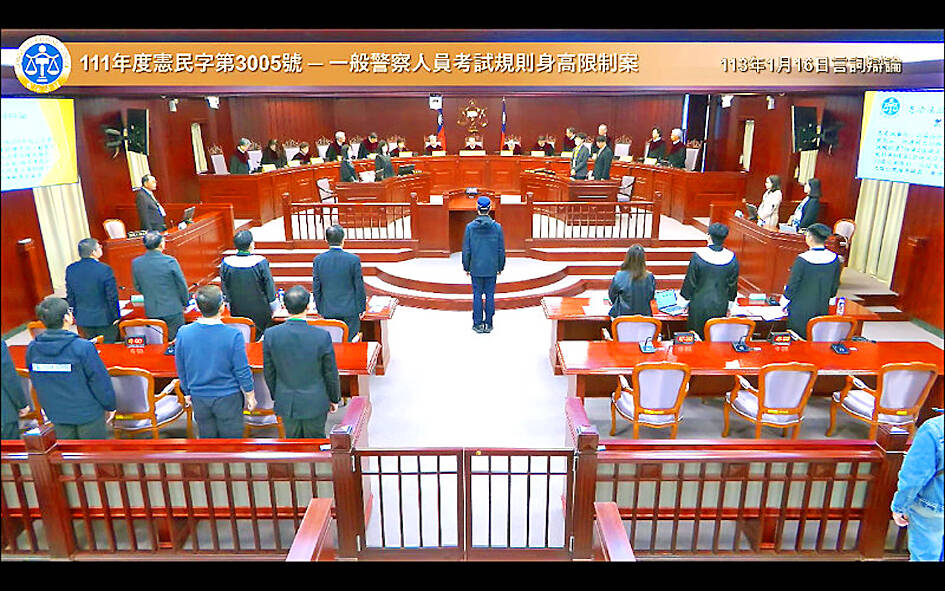The Constitutional Court on Tuesday heard oral arguments in the case of a woman suing the government for discrimination after being disqualified from serving as a firefighter because she was deemed too short.
In 2018, the plaintiff, surnamed Chen (陳), passed the class 4 firefighter and police certification test, but failed the physical examination as, at 158.9cm, she was 1.1cm short of the height requirement.
The Civil Service Protection and Training Commission a year later rejected her application to be a firefighter, citing the height requirement stipulated in the regulations governing qualifications for police officers and firefighters.

Photo: Screen grab from a Constitutional Court’s video
Chen’s lawyer told the court that the height requirement is discriminatory and that barring Chen from becoming a firefighter is an infringement of her right to work in government.
The requirements that non-
indigenous female police and firefighter applicants must be at least 160cm tall has no rational basis, her lawyer said, adding that setting separate certification standards for genders and ethnicities is discriminatory.
The height requirement for men to join the service is less stringent than for women, as more than 90 percent of 18-year-old Taiwanese men meet the 165cm requirement, but only 45 percent of 18-year-old Taiwanese women meet the 160cm requirement, the lawyer said.
Setting height requirements according to gender and ethnicity is a form of discrimination based on intrinsic and unalterable traits, which is not constitutionally justifiable, the lawyer said.
In addition, the regulation states that physical examinations are to be conducted “when necessary,” which is vague legal language that contravenes the doctrine against ambiguity in law, they said.
Lawyers representing the Ministry of Examination and the Ministry of the Interior said that the rules on height requirements are to help ensure that firefighters and police officers are strong enough to perform their functions, which is legally justifiable.
The opportunity to work in public service is rightfully limited to people possessing appropriate competencies and qualifications, they said.
Establishing standards for a type of service is typically the executive branch’s prerogative, which cannot be challenged without cause, the lawyers said.
Height standards differ according to gender due to fieldwork requirements, they said, adding that the height requirement for indigenous people, who are shorter than the average Taiwanese, is lower to ensure equal opportunities.
The recruiting agency’s order for Chen to undergo additional physical examinations to ensure she met the physical standards is a proper exercise of discretion and demonstration of what necessity meant in the rules, they said.
Removing the height requirement would compromise public safety and could place the lives of first responders at a higher risk, National Fire Agency Director-General Hsiao Huan-chang (蕭煥章) told the court.
Judicial Yuan President Hsu Tzong-li (宗力諭) said the court would deliver its judgement no later than five months after the hearing in accordance with the law.

Taiwan has received more than US$70 million in royalties as of the end of last year from developing the F-16V jet as countries worldwide purchase or upgrade to this popular model, government and military officials said on Saturday. Taiwan funded the development of the F-16V jet and ended up the sole investor as other countries withdrew from the program. Now the F-16V is increasingly popular and countries must pay Taiwan a percentage in royalties when they purchase new F-16V aircraft or upgrade older F-16 models. The next five years are expected to be the peak for these royalties, with Taiwan potentially earning

STAY IN YOUR LANE: As the US and Israel attack Iran, the ministry has warned China not to overstep by including Taiwanese citizens in its evacuation orders The Ministry of Foreign Affairs (MOFA) yesterday rebuked a statement by China’s embassy in Israel that it would evacuate Taiwanese holders of Chinese travel documents from Israel amid the latter’s escalating conflict with Iran. Tensions have risen across the Middle East in the wake of US and Israeli airstrikes on Iran beginning Saturday. China subsequently issued an evacuation notice for its citizens. In a news release, the Chinese embassy in Israel said holders of “Taiwan compatriot permits (台胞證)” issued to Taiwanese nationals by Chinese authorities for travel to China — could register for evacuation to Egypt. In Taipei, the ministry yesterday said Taiwan

‘LIKE-MINDED PARTNER’: Tako van Popta said it would be inappropriate to delay signing the deal with Taiwan because of China, adding he would promote the issue Canadian senators have stressed Taiwan’s importance for international trade and expressed enthusiasm for ensuring the Taiwan-Canada trade cooperation framework agreement is implemented this year. Representative to Canada Harry Tseng (曾厚仁) in an interview with the Central News Agency (CNA) said he was increasingly uneasy about Ottawa’s delays in signing the agreement, especially as Ottawa has warmed toward Beijing. There are “no negotiations left. Not only [is it] initialed, we have three versions of the text ready: English, French and Mandarin,” Tseng said. “That tells you how close we are to the final signature.” Tseng said that he hoped Canadian Prime Minister Mark Carney

POSITIVE DEVELOPMENT: Japan and the US are expected to hold in-depth discussions on Taiwan-related issues during the meeting next month, Japanese sources said The holding of a Japan-US leaders’ meeting ahead of US President Donald Trump’s visit to China is positive news for Taiwan, former Japan-Taiwan Exchange Association representative Hiroyasu Izumi said yesterday. After the Liberal Democratic Party’s landslide victory in Japan’s House of Representatives election, Japanese Prime Minister Sanae Takaichi is scheduled to visit the US next month, where she is to meet with Trump ahead of the US president’s planned visit to China from March 31 to April 2 for a meeting with Chinese President Xi Jinping (習近平). Japan and the US are expected to hold in-depth discussions on Taiwan-related issues during the